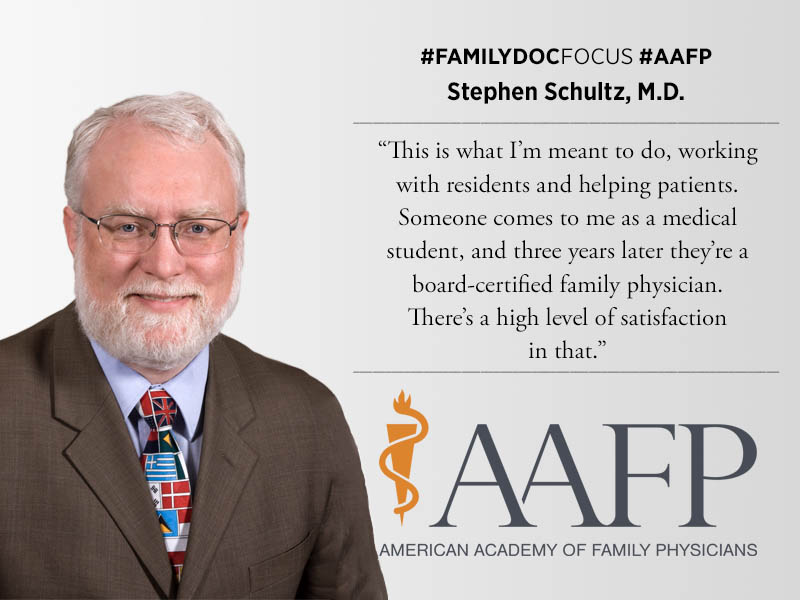Mentor Has Left His Mark on Residency Program
February 1, 2021, 2:10 pm David Mitchell — For some, the role of residency program director might be viewed as a stepping stone in an academic medicine career. For Stephen Schultz, M.D., it was the ultimate destination.

“The natural place for a residency director to go is chair,” said Schultz, who has been the program director at the University of Rochester/Highland Hospital Family Medicine Residency program since 2002. “But this is what I’m meant to do, working with residents and helping patients. Someone comes to me as a medical student, and three years later they’re a board-certified family physician. There’s a high level of satisfaction in that.”
Schultz has left his stamp on the program over the course of nearly two decades, starting tracks for global health and advocacy as well as launching an Explorers group that exposes local high school students to medical careers. During the virtual Residency Leadership Summit (formerly PDW-RPS), March 4-6, he will be honored for his efforts by the AAFP and the Association of Family Medicine Residency Directors with the Nikitas J. Zervanos Outstanding Program Director Award. The honor will be added to a lengthy curriculum vitae that already includes numerous awards for teaching and leadership from the Academy, the AFMRD, the Society of Teachers of Family Medicine and state and local organizations.
“When I look at the list of previous winners, it’s humbling,” he said. “These are people I look up to.”
Schultz is putting residents on a path to become leaders in their own careers. He required funding for the advocacy and global health tracks as a condition of his hiring as program director.
“My goal is to have people leave with skills they need to advocate for our specialty and patients,” said Schultz, who also is an associate professor in the Department of Family Medicine at the University of Rochester.
Residents learn to write letters to policymakers as well as how to make visits (and maintain relationships) with legislators. Residents also have opportunities to put their knowledge to work at the state capitol, and legislators are invited to visit the program.
Schultz said Rochester’s residents regularly serve in leadership roles at the local, state and national levels.
“We encourage people to run for office,” said Schultz, who has served on the board of directors of the AFMRD and the New York State AFP, “and I find coverage for them to go to meetings if they do.”
This month, the residency program will have its annual meeting with editors from the local newspaper.
“We’ll talk about what editors look for in letters to the editor, how to get published and get your message across,” Schultz said. “It’s been a huge draw for a few years.”
In the global health program, more than a dozen people — residents, medical and undergraduate students, and faculty — travel to the same group of rural villages in Honduras for two weeks twice a year to provide clinical care and work on community projects.
Primary prevention projects have included a fluoride program in elementary schools and training sessions for midwives. The program also has established a scholarship fund for students to pursue post-grade school education.
The residency also helped implement a water system that included creating 5,000-gallon storage tanks that fill during the rainy season, filtration systems and more than eight miles of piping that carry water from a spring to individual homes. That infrastructure, which resulted in cleaner water for residents, replaced a daily, two-hour process that involved people carrying water from a river.
Schultz credited faculty member Douglas Stockman, M.D., with conceiving some of the global health program’s best projects, including the creation of fish farms.
“What they need, we can help with,” Schultz said. “We try to implement sustainable programs. We don’t want to start something that makes them dependent on us.”
Locally, Schultz had to put Rochester’s Explorers program on hold this school year due to COVID-19. He hopes to resume the program next year, not only to benefit the roughly two dozen high school students who participate but because the experience is good for residents, too. Rochester’s residents lead the teens in workshops on topics such as physical exams, suturing and diabetes.
“One of the things we do as family physicians is go out in the community as health educators,” he said. “This is an opportunity to learn what language to use, what visual cues work, what holds people’s interest and how to connect with this age group and the public in general.”
On Valentine’s Day, Schultz will be participating in the Rochester Polar Plunge, one of his favorite community events, for the 17th year in a row. The Lake Ontario event is the largest polar plunge in New York — with more than 2,000 participants — and benefits Special Olympics. Schultz’s Docs Who Dunk group, which includes residents, has raised more than $15,000 for the cause over the years. He has one rule: “You have to get your head under,” he said, “none of this wading into your knees stuff.”